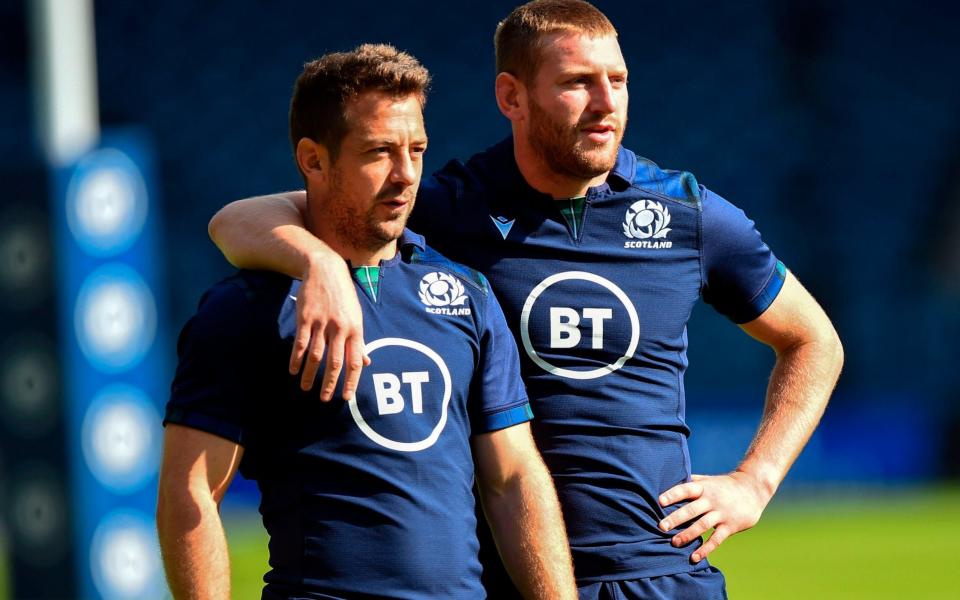Scotland look to dependable Greig Laidlaw ahead of Rugby World Cup warm-up meeting with France

Take a back seat, Jim Mallinder. The preparations for Scotland’s return fixture against France may have been temporarily overshadowed by the news that the Rugby Football Union’s performance pathway coach is to take over as performance director at Murrayfield, but more immediate priorities quickly reasserted themselves.
After some quick chat about Mallinder’s appointment, it was Scotland captain Greig Laidlaw who re-established the focus on Saturday's game at Murrayfield by reminding everyone that “at this level it’s all about winning games”, particularly following the thrashing in Nice last week. Gregor Townsend no doubt shares those sentiments, which is why he has not only drafted in the little scrum-half, but asked him to lead the side and take on kicking duties.
Laidlaw may not be a natural exponent of the superfast brand of rugby Townsend aspires to play, but when Scotland need digging out of a hole, the coach invariably turns to the 33-year-old. When Wales thrashed a clueless and Laidlaw-less Scotland in Townsend’s first Six Nations game, in he came. When France were overwhelming Scotland at Murrayfield as Finn Russell endured a nightmarish first half, Laidlaw moved to stand-off and saved the day. From there, Scotland won three games to finish third in the Six Nations. Townsend’s selection for Saturday's match shows 14 changes from last week, with emphasis on experience and power to stymie France’s ball-carriers.

It is an approach epitomised by the naming of Laidlaw as captain. Under the canny Borderer, Scotland have never gone down without a fight, and with France naming a stronger side than last week, the Scots will need Laidlaw’s aggression, obduracy and intelligence.
The Clermont scrum-half faces a three-way selection fight with Ali Price and George Horne, and knows this is a huge opportunity. “I know what I give to the team – direction, tactics, playing in the right place at the right time. So I’ll just keep doing what I’m doing and if that’s enough for me to start, then so be it. If not, then I’ll just keep doing my job for the team,” he said.
Few are more aware of what Laidlaw brings than assistant coach Mike Blair, Edinburgh’s starting scrum-half when he came through at the age of 25, and Scotland’s No 9 when Laidlaw won the first of his 71 caps at outside-half in 2010. He believes his leadership will mean Scotland react better if France get on the front foot again.
“We had a younger team in Nice,” said Blair. “Losing the try early on shouldn’t have been devastating but we were dominated. This week, there is a more experienced look about the team; it will react well to difficult circumstances. This is Greig’s opportunity to show what he can do again, although we’re aware he’s a real competitor, while the leadership and control he brings are a given. He’s got a very astute tactical brain, so when things aren’t going so well, the players look to him for feedback and leadership.”

Under Laidlaw, Scotland are likely to play a tight game against a France side he believes are dark horses for the World Cup. With mobile, front-five forwards in hooker George Turner and second rows Sam Skinner and Scott Cummings, who will be working with an abrasive back row of Hamish Watson, Ryan Wilson and debutant No 8 Blade Thomson, Scotland should be more aggressive in defence.
In attack, wings Sean Maitland and Tommy Seymour are outstanding kick-chasers, while outside centre Chris Harris has the ability to truck it up the middle of the park.
Although Blair estimates that there are just two World Cup places to be decided – presumably in the back row and centres – the surrender in Nice means that a lot of players still believe they can play their way into Scotland’s World Cup 31.
“It was difficult to watch in Nice,” said Laidlaw. “[At Murrayfield] we just have to be tighter in those first 10 minutes, stick the ball up our jumper, and be a bit more direct.”

